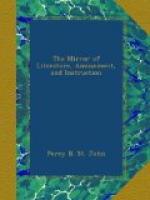Having frequently observed in your valuable publication the great attention which you have paid to every thing relating to the “Immortal Bard of Avon,” I beg leave to transmit to you two drawings (the one back, the other front) of a brooch or buckle, found near the residence of the poet, at New Place, Stratford, among the rubbish brought out from the spot where the house stood. This brooch is considered by the most competent judges and antiquarians in and near Stratford, to have been the personal property of Shakspeare. A. is the back; 1 and 2, faint traces of the letters which were nearly obliterated, by the person who found the relic, in scraping to ascertain whether the metal was precious, the whole of it being covered with gangrene or verdigris. 3 and 4 are the remains of the hinge to the pin. Fortunately the W. at the corner was preserved. B. represents the front of the brooch; 1, 3, and 5, are red stones in the top part (similar in shape to a coronet) 2 and 4 are blue stones in the same; the other stones in the bottom or heart are white, though varying rather in hue, and all are set in silver.
HJTHWC.
N.B. The above is shown to the curious by the individual who found it—a poor man named Smith, living in Sheep Street, Stratford.
* * * * *
SPIRIT OF THE PUBLIC JOURNALS
* * * * *
The greater portion of the following Notes will, we are persuaded, be new to all but the bibliomaniacs in theatrical lore. They occur in a paper of 45 pages in the last Edinburgh Review, in which the writer attributes the Decline of the Drama to a variety of causes—as late hours, costly representations, high salaries, and excessive taxation—some of which we have selected for extract. In our affection for the Stage, we have paid some attention to its history, as well as to its recent state, and readily do we subscribe to a few of the Reviewer’s opinions of the cause of its neglect. But to attribute this falling off to “taxes innumerable” is rather too broad: perhaps the highly-taxed wax lights around the box circles suggested this new light. We need not go so far to detect the rottenness of the dramatic state; still, as the question involves controversy at every point, we had rather keep out of the fight, and leave our Reviewer without further note or comment.
NOTES ON THE DRAMA.
(FROM THE EDINBURGH REVIEW, NO. 98.)
ORIGIN OF ADMISSION MONEY.




